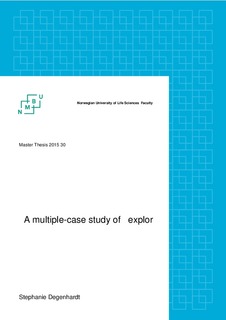| dc.description.abstract | Seaweed farming has existed in Unguja, Zanzibar for twenty-five years. However, its substantial rise in production and the positive socio-economic impacts it has are now threatened by multiple disturbances, which jeopardize the viability of seaweed farming as a valuable livelihood activity. This thesis examines the challenges and possibilities of seaweed farming as a resilient social- ecological system (SES), in particular in the villages of Matemwe and Paje. Data was collected through semi-standardized interviews with active and non-active seaweed farmers, buying station officers and buying companies, in addition to unstandardized in-depth interviews with a seaweed farmer, the governmental agency and a non-governmental organisation. Complementary data was retrieved from field observations, measurements of phosphorus at the farm sites, analysis of satellite imagery, and unpublished official mariculture statistics. This thesis is guided by the conceptual framework of social ecological resilience, and complemented with an additional perspective provided by the vulnerability concept. The study analyses the complexity of interrelated socio-economic and ecological dynamics over multiple scales that led to a reduced resilience of the SES by identifying key drivers of change and their dynamics. The study finds these to be slow changing environmental conditions that led to unfavourable farming conditions as well as decreasing and unequal spread of knowledge, failed attempts to form cooperatives and monopsonistic market structures leading to higher farmer dependency on existing system structures. The study also finds that disproportional price developments and waning farmer-buyer relationships further fuelled a shift of farming activities away from Unguja. These dynamics have fed back to steadily weaken the system’s adaptive capacity and thereby reduce its overall resilience, giving rise to vulnerable conditions and susceptibility to disturbances in the form of widespread disease and seaweed die-off. Furthermore, these dynamics have pressed the system towards one or several critical ecological and socio-economic thresholds, which in light of the lacking adaptability of current management policies, creates great risk of it flipping into a degraded state. Thus, the study concludes by stressing the importance of adaptive management that would allow for development through learning, adaption and transformability. | nb_NO |
